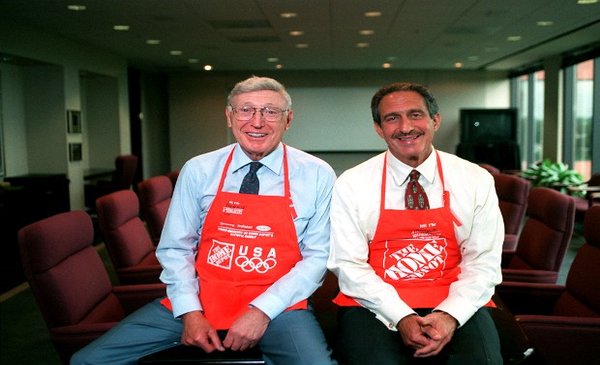The following excerpt is a sampling of “The Daily Drucker,” a collection of key statements from my writings, followed by explanation and comments, also from my work, on topics ranging across a great many fields: management, business and the world economy; a changing society; innovation and entrepreneurship; decision making; the changing work force; the nonprofits and their management; and so on.
Integrity In Leadership
The spirit of an organization is created from the top.
The proof of the sincerity and seriousness of a management is uncompromising emphasis on integrity of character. This, above all, has to be symbolized in management’s “people” decisions. For it is character through which leadership is exercised; it is character that sets the example and is imitated.
Character is not something one can fool people about. The people with whom a person works, and especially subordinates, know in a few weeks whether he or she has integrity or not. They may forgive a person for a great deal: incompetence, ignorance, insecurity, or bad manners. But they will not forgive a lack of integrity in that person. Nor will they forgive higher management for choosing him.
This is particularly true of the people at the head of an enterprise. For the spirit of an organization is created from the top. If an organization is great in spirit, it is because the spirit of its top people is great. If it decays, it does so because the top rots; as the proverb has it, “Trees die from the top.” No one should ever be appointed to a senior position unless top management is willing to have his or her character serve as the model for subordinates.
Action point: Evaluate the character of the chief executive officer and top management when considering a job offer. Align yourself with people who have integrity.
Identifying The Future
The important thing is to identify the “future that has already happened.”
Futurists always measure their batting average by counting how many things they have predicted that have come true. They never count how many important things come true that they did not predict.
Everything a forecaster predicts may come to pass. Yet, he may not have seen the most meaningful of the emergent realities or, worse still, may not have paid attention to them. There is no way to avoid this irrelevancy in forecasting, for the important and distinctive are always the result of changes in values, perception and goals, that is, in things that one can divine but not forecast.
But the most important work of the executive is to identify the changes that have already happened. The important challenge in society, economics, politics, is to exploit the changes that have already occurred and to use them as opportunities. The important thing is to identify the “future that has already happened” — and to develop a methodology for perceiving and analyzing these changes.
Action point: Identify the major trends in your market that have already appeared. Write a page on their likely longevity and impact on your life and organization.
Management Is Indispensable
Whoever makes two blades of grass grow where only one grew before deserves better of mankind than any speculative philosopher or metaphysical system builder.
Management will remain a basic and dominant institution perhaps as long as Western civilization itself survives. For management is not only grounded in the nature of the modern industrial system and in the needs of modern business enterprise, to which an industrial system must entrust its productive resources, both human and material.
Management also expresses the basic beliefs of modern Western society. It expresses the belief in the possibility of controlling man’s livelihood through the systematic organization of economic resources. It expresses the belief that economic change can be made into the most powerful engine for human betterment and social justice — that, as Jonathan Swift first overstated it 300 years ago, whoever makes two blades of grass grow where only one grew before deserves better of mankind than any speculative philosopher or metaphysical system builder.
Management — which is the organ of society specifically charged with making resources productive, that is, with the responsibility for organized economic advance — therefore reflects the basic spirit of the modern age. It is, in fact, indispensable, and this explains why, once begotten, it grew so fast and with so little opposition.
Action point: Come up with a few examples of why management, its competence, its integrity, and its performance, is so decisive to the free world.
Organizational Inertia
All organizations need a discipline that makes them face up to reality.
All organizations need to know that virtually no program or activity will perform effectively for a long time without modification and redesign. Eventually every activity becomes obsolete. Among organizations that ignore this fact, the worst offender is government. Indeed, the inability to stop doing anything is the central disease of government and a major reason why government today is sick. Hospitals and universities are only a little better than government in getting rid of yesterday.
Businessmen are just as sentimental about yesterday as bureaucrats. They are just as likely to respond to the failure of a product or program by doubling the efforts invested in it. But they are, fortunately, unable to indulge freely in their predilections. They stand under an objective discipline, the discipline of the market. They have an objective outside measurement, profitability. And so they are forced to slough off the unsuccessful and unproductive sooner or later. In other organizations — government, hospitals, the military, and so on — economics is only a restraint.
All organizations must be capable of change. We need concepts and measurements that give to other kinds of organizations what the market test and profitability yardstick give to business. Those tests and yardsticks will be quite different.
Action point: Make sure your nonprofit organization has rigorous tests and yardsticks to measure performance.
Abandonment
There is nothing as difficult and as expensive, but also nothing as futile, as trying to keep a corpse from stinking.
Effective executives know that they have to get many things done effectively. Therefore, they concentrate. And the first rule for the concentration of executive efforts is to slough off the past that has ceased to be productive. The first-class resources, especially those scarce resources of human strength, are immediately pulled out and put to work on the opportunities of tomorrow. If leaders are unable to slough off yesterday, to abandon yesterday, they simply will not be able to create tomorrow.
Without systematic and purposeful abandonment, an organization will be overtaken by events. It will squander its best resources on things it should never have been doing or should no longer do. As a result, it will lack the resources, especially capable people, needed to exploit the opportunities that arise. Far too few businesses are willing to slough off yesterday, and as a result, far too few have resources available for tomorrow.
Action point: Stop squandering resources on obsolete businesses and free up your capable people to take advantage of new opportunities.
The Blake Project Can Help: Disruptive Brand Strategy Workshop
Branding Strategy Insider is a service of The Blake Project: A strategic brand consultancy specializing in Brand Research, Brand Strategy, Brand Licensing and Brand Education




